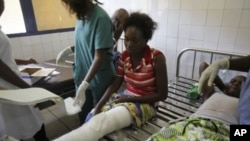The medical aid agency Doctors Without Borders, known by its French acronym MSF, says an increase in the number of armed conflicts and troop movements in the eastern Democratic Republic of Congo are hampering its operations there.
Cyril Bertrand, operational coordinator for MSF Belgium, tells VOA that rising violence and crime within the past few months have made it more and more difficult to get medical aid to those who need it.
“Last week we faced harassment and two of our colleagues were kidnapped near Nyanzale," said Bertrand. "Before, by the end of 2011, we faced an incident as well in Masisi. At that time, one expatriate was injured by gunshots.”
According to the group’s statement, released Thursday, the aid agency’s teams have been exposed to more than 15 acts of violence since last November, among the most serious being a raid last week on an MSF house in Baraka in South Kivu province, carried out by armed men in uniform.
Typically, food, money, and mobile telephones are stolen, mostly to supply the military, says the group.
Bertrand says it is the people living in North and South Kivu who bear the brunt of the violence’s consequences.
“The teams have been evacuated from many places, because we cannot work in a safe situation," said Bertrand. "We had to evacuate five places since last week.”
The group has suspended its activities in Nyanzale, reduced programs in Rutshuru, and recalled its team from the Butembo area.
The statement says local populations are too afraid to come to clinics or even to cultivate in the fields, as people are commonly robbed, forced to carry armed men’s bags, and sometimes kidnapped.
The latest volatility is due mainly to mass defections of former rebels from the Congolese army. The defecting soldiers are loyal to former rebel leader Bosco Ntaganda, who has been indicted by the International Criminal Court (ICC). Last month, the ICC convicted Ntaganda’s boss, Thomas Lubanga, for using child soldiers.
The rebels, who had been integrated into the Congolese army in an earlier peace deal, have taken ammunition and other military equipment with them as they flee their units, committing crimes and violence along the way.
On Wednesday, President Joseph Kabila said he is seeking Ntaganda's arrest, though he said the former rebel leader would be tried in Congo rather than handed over to the ICC.
News
Aid Group Says Unrest Makes Eastern DRC Operations Unsafe




